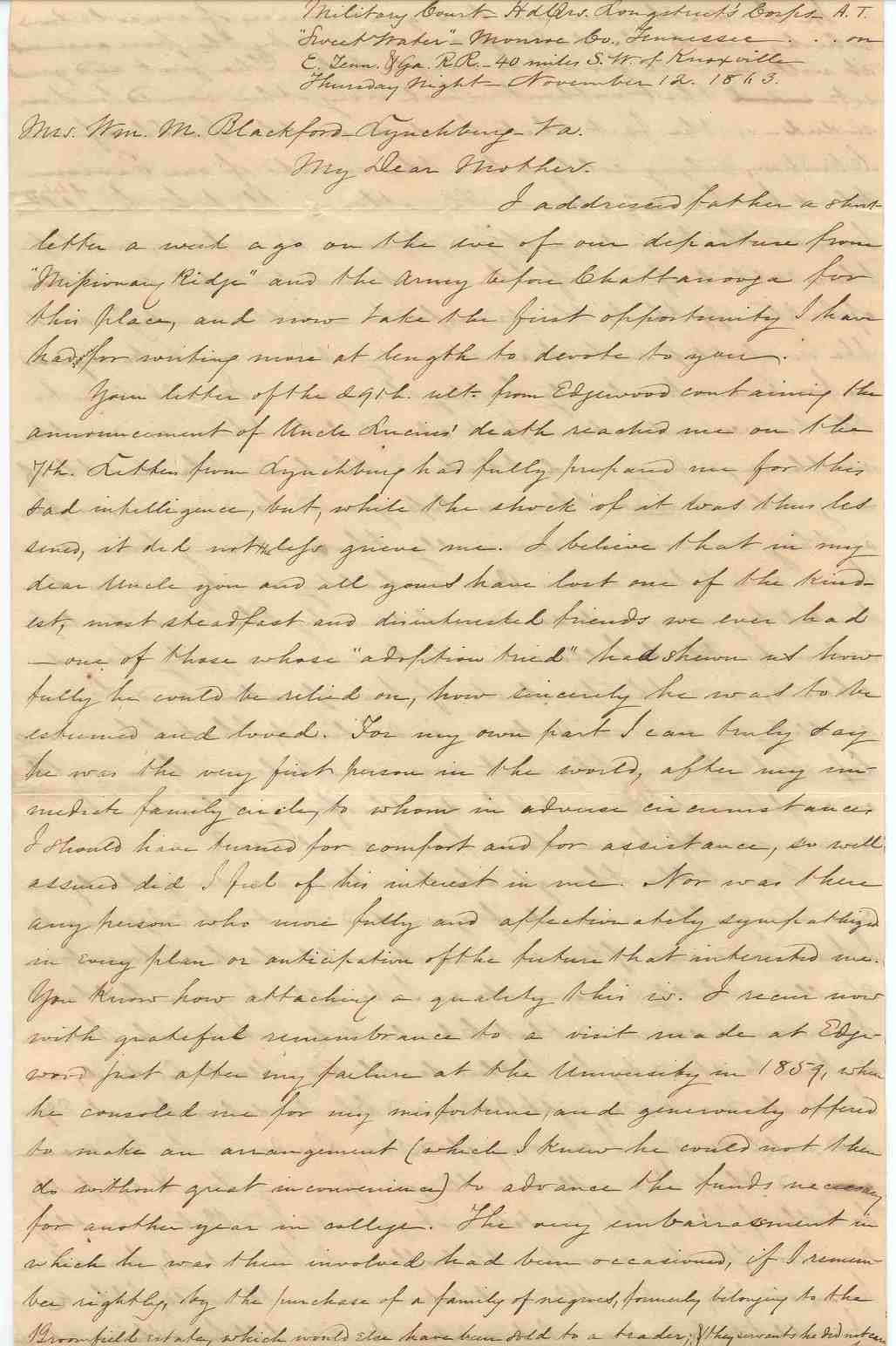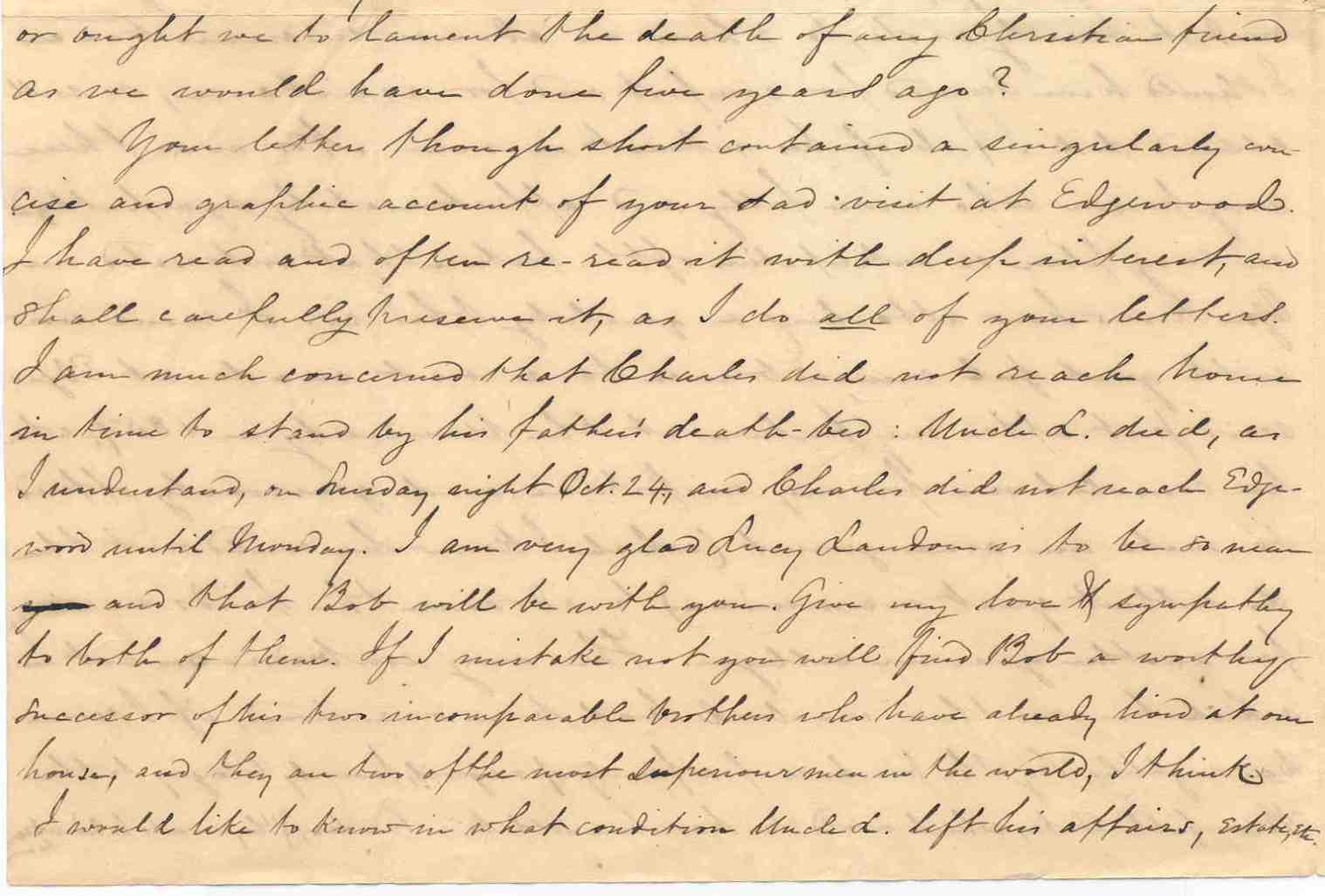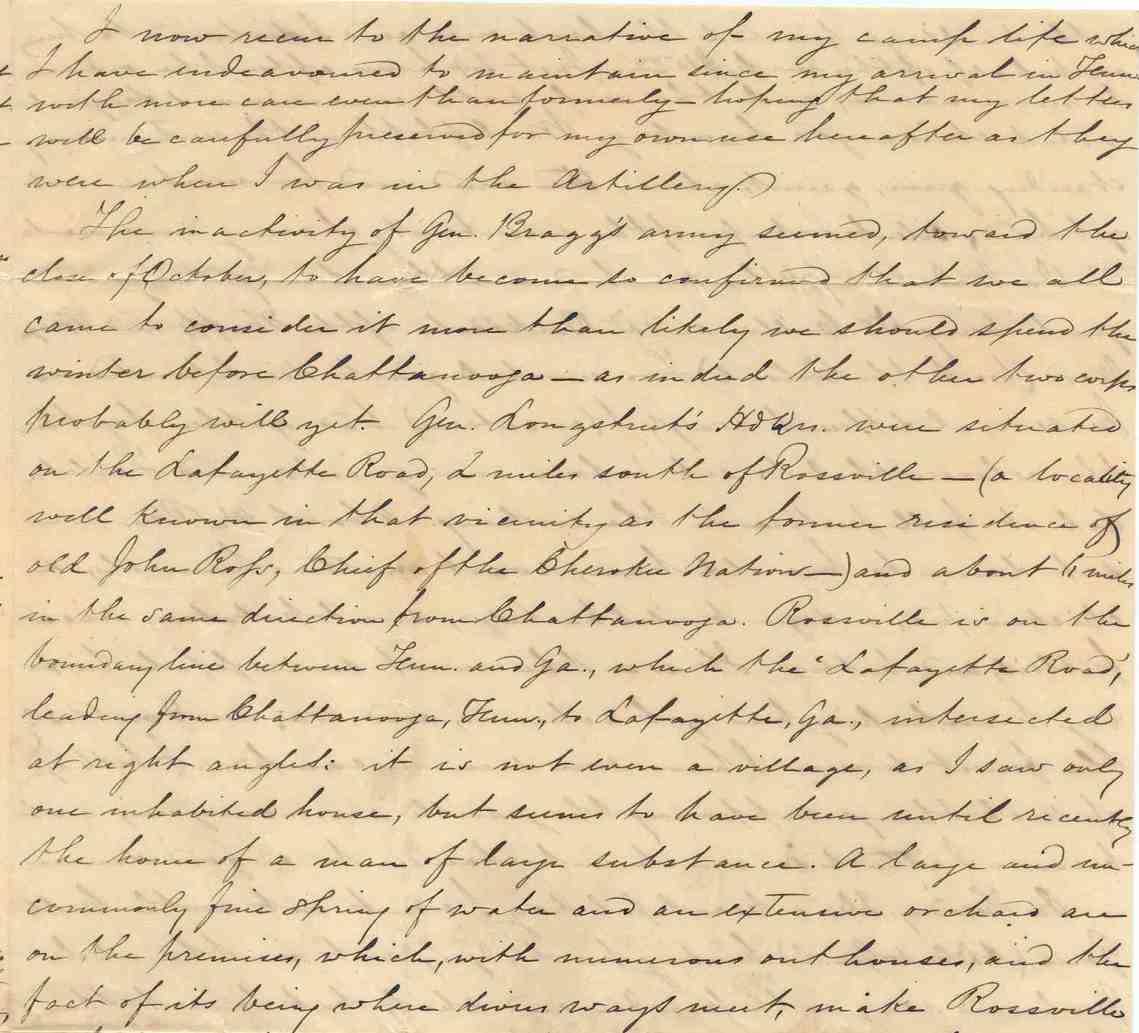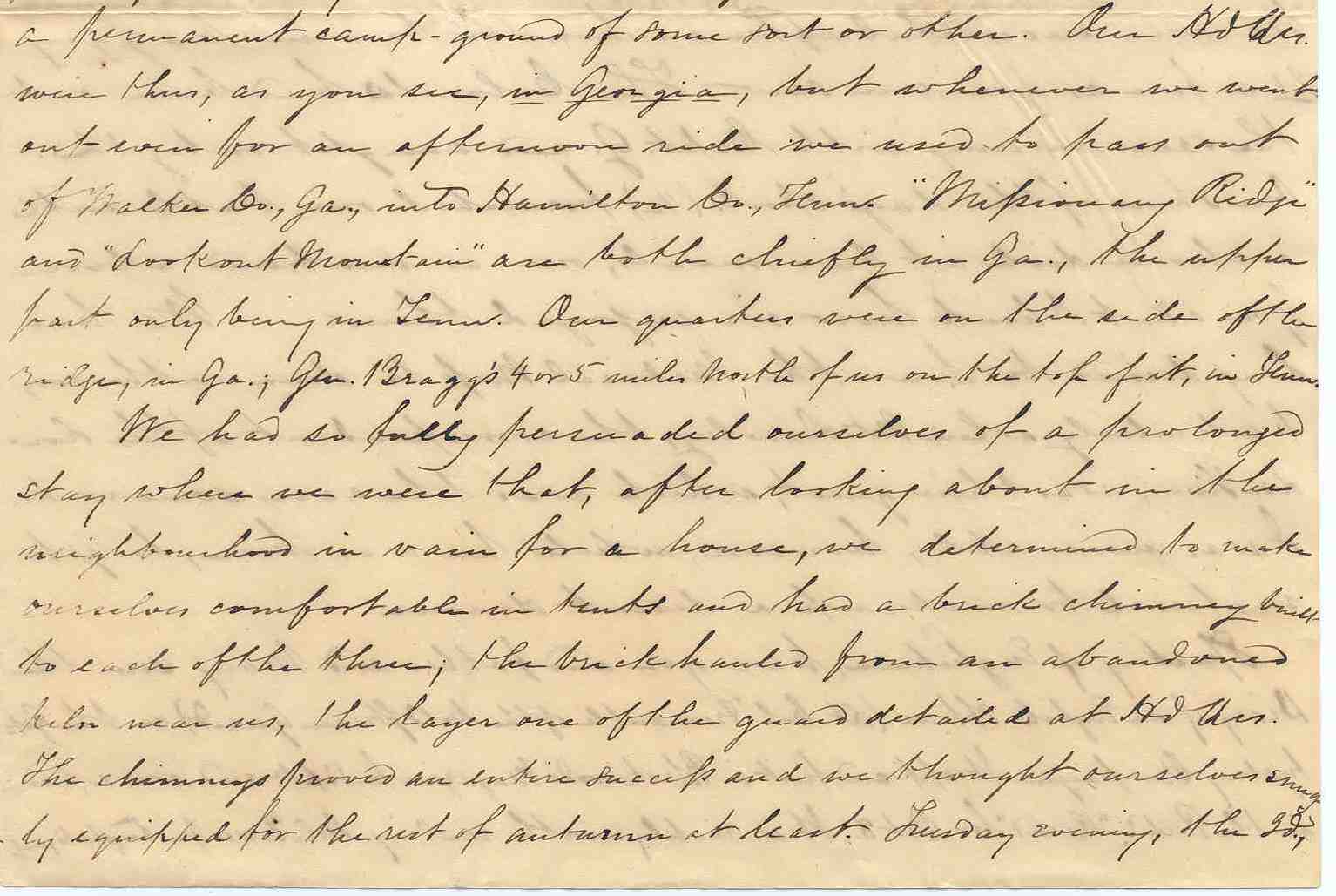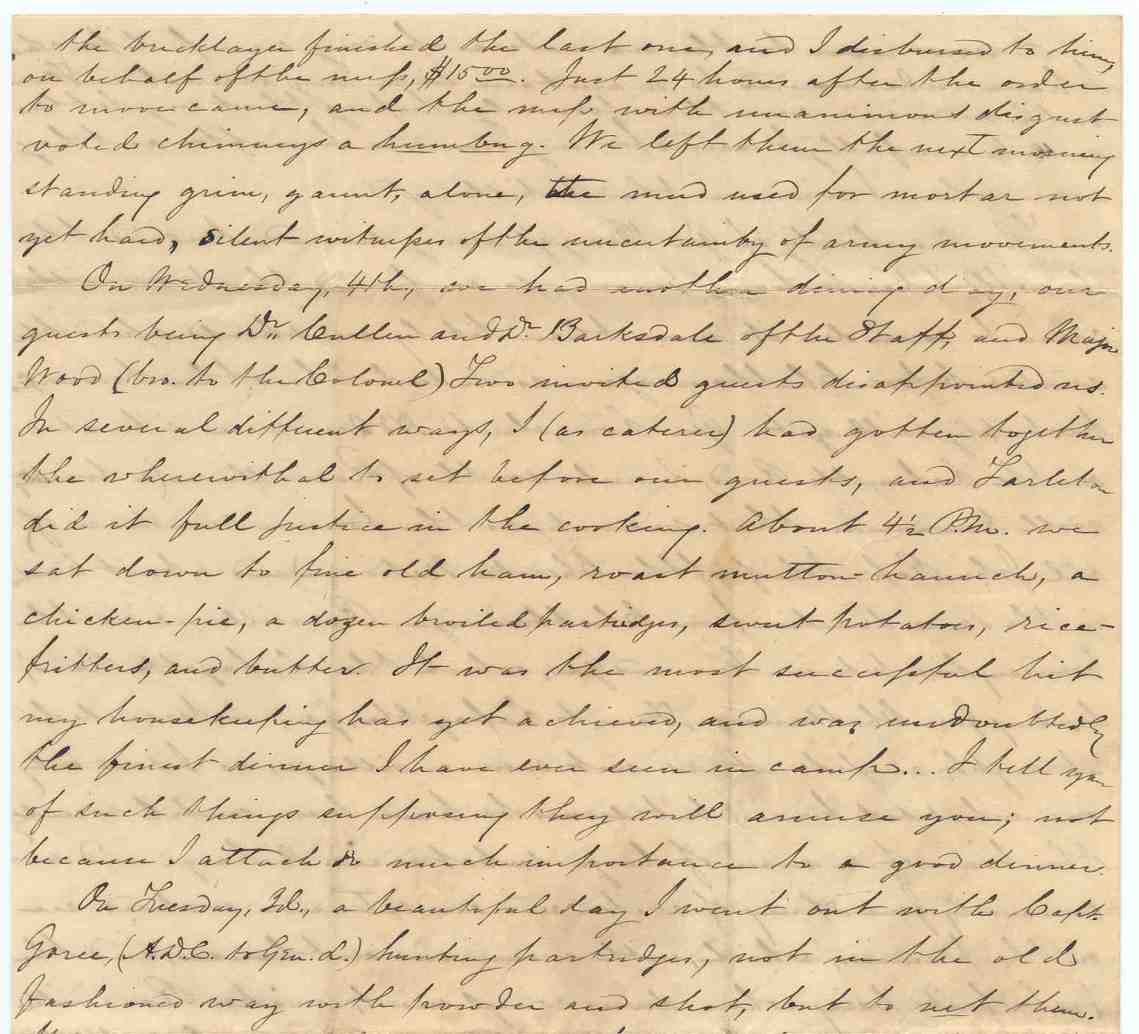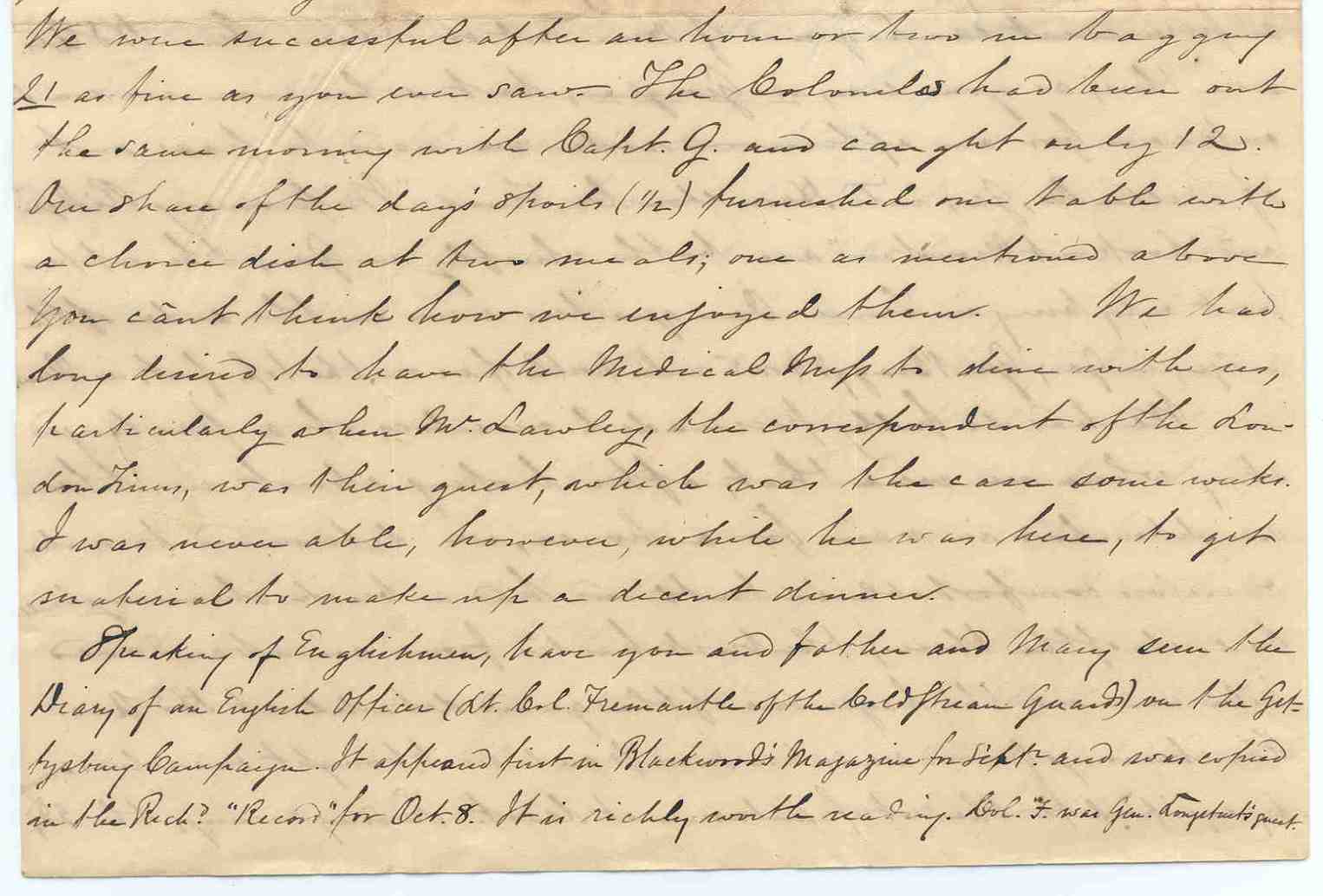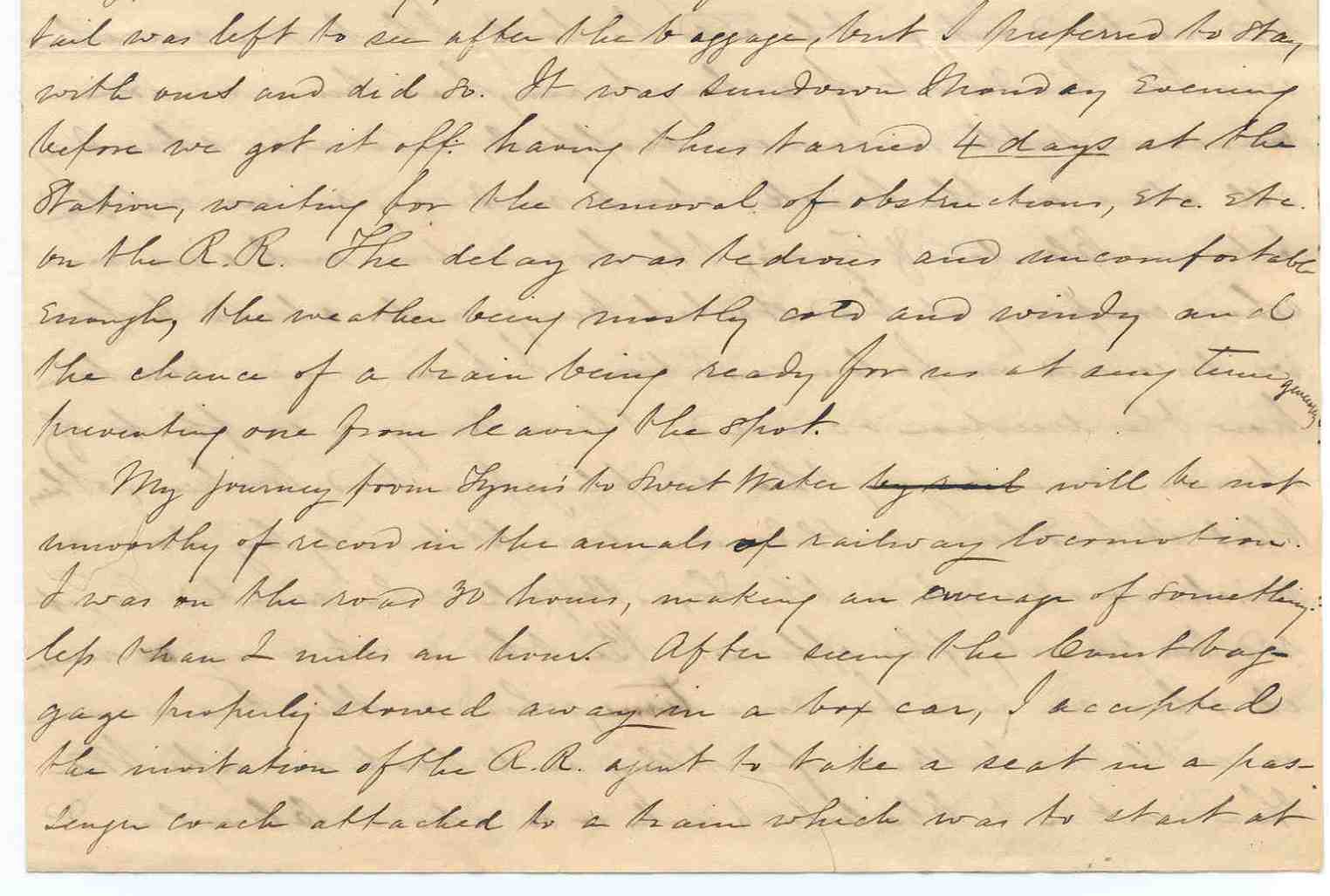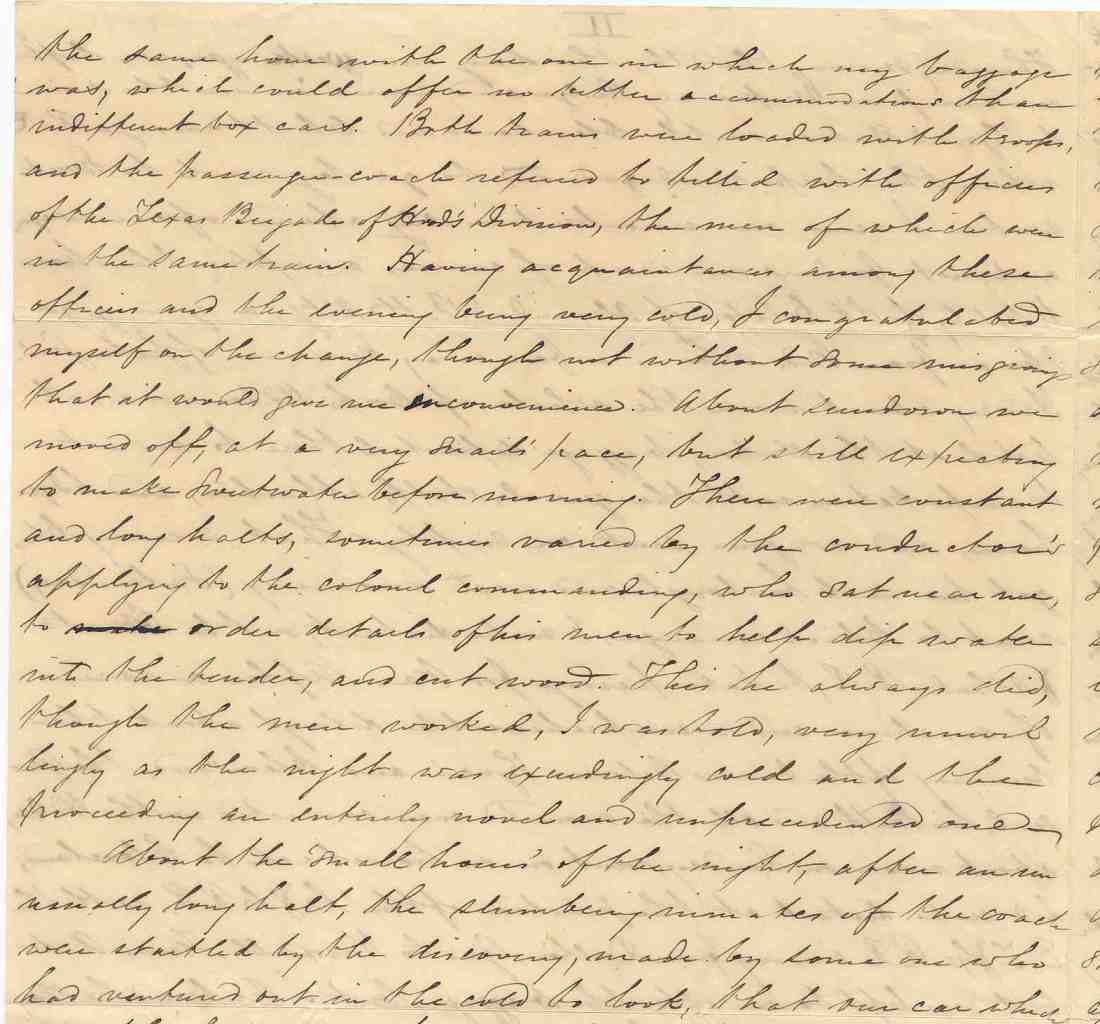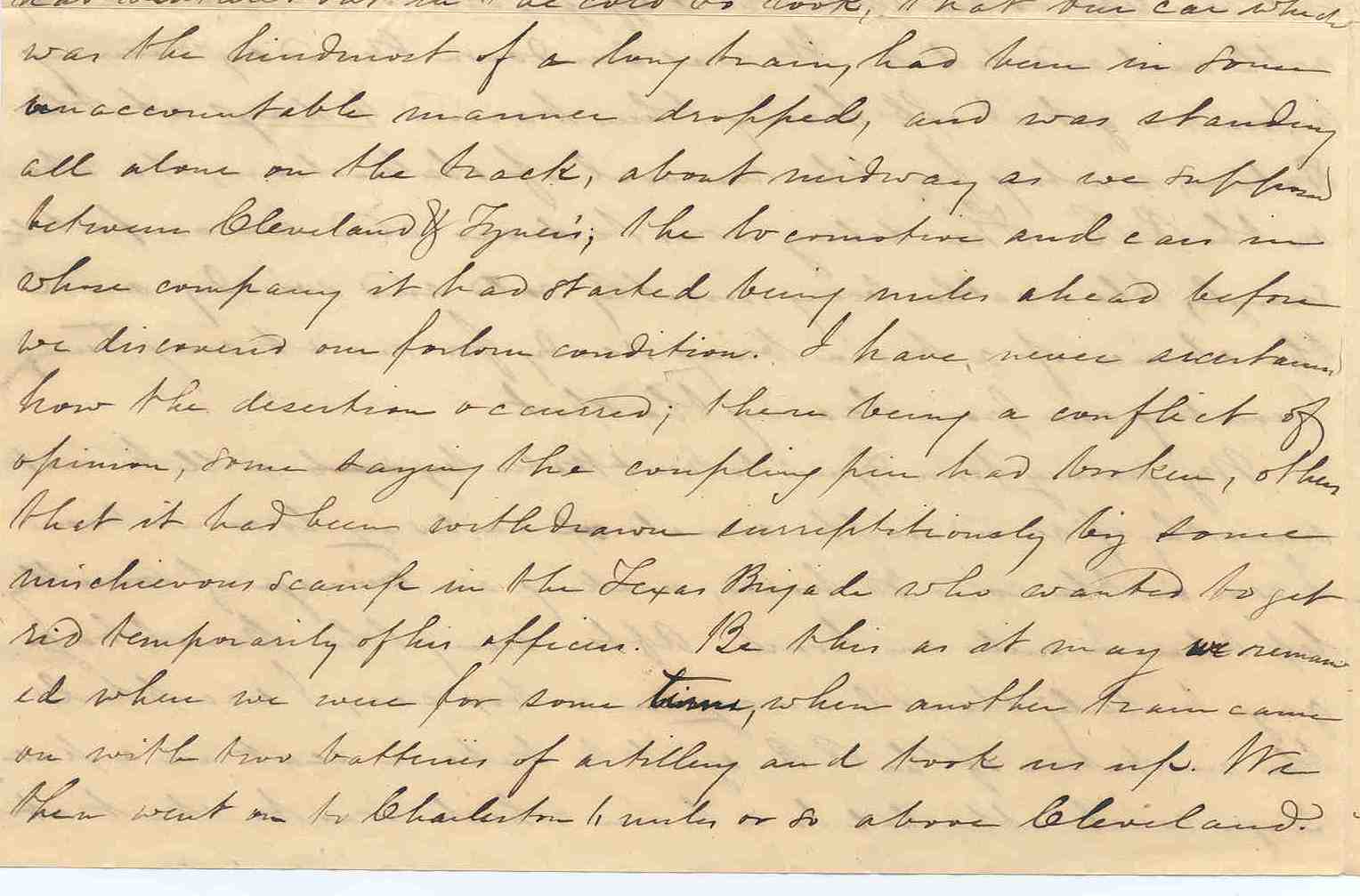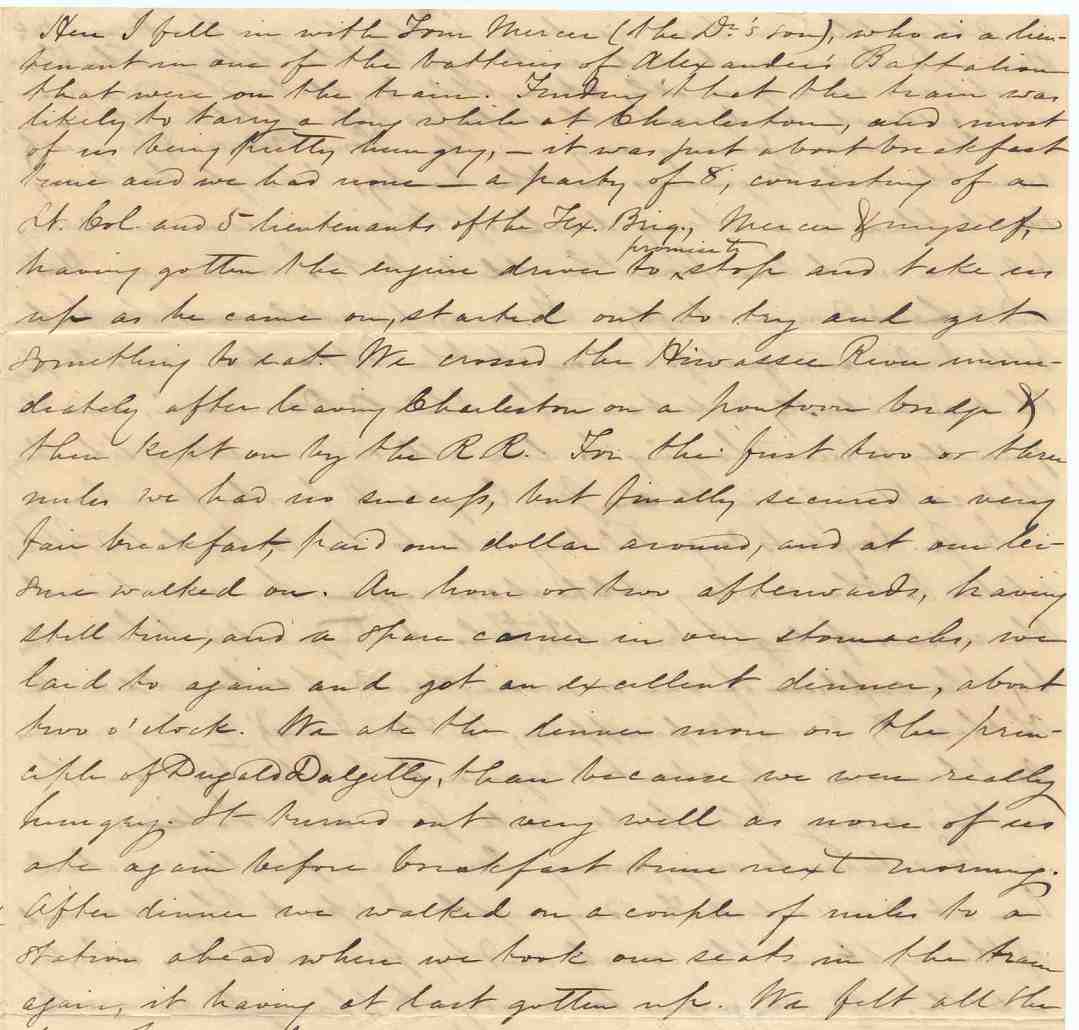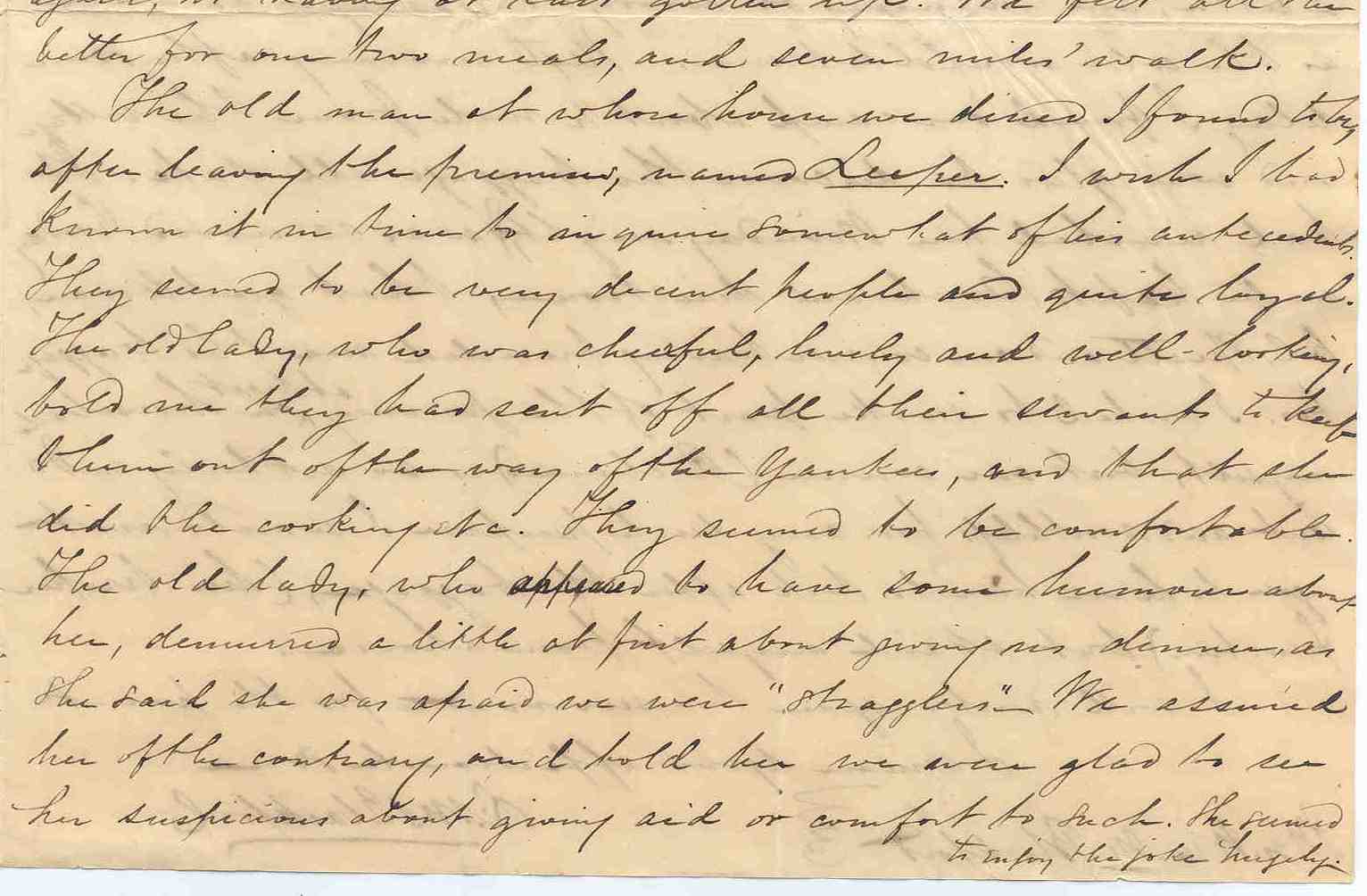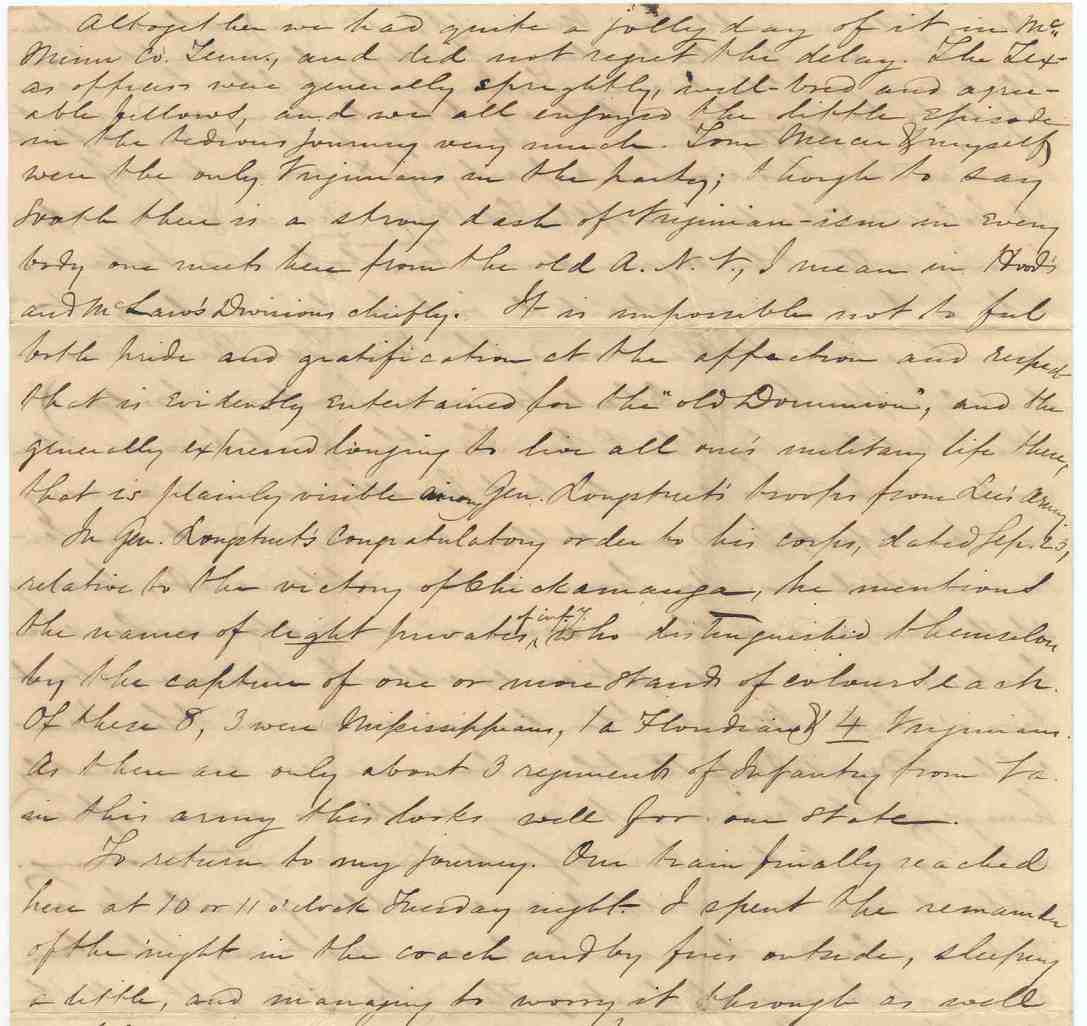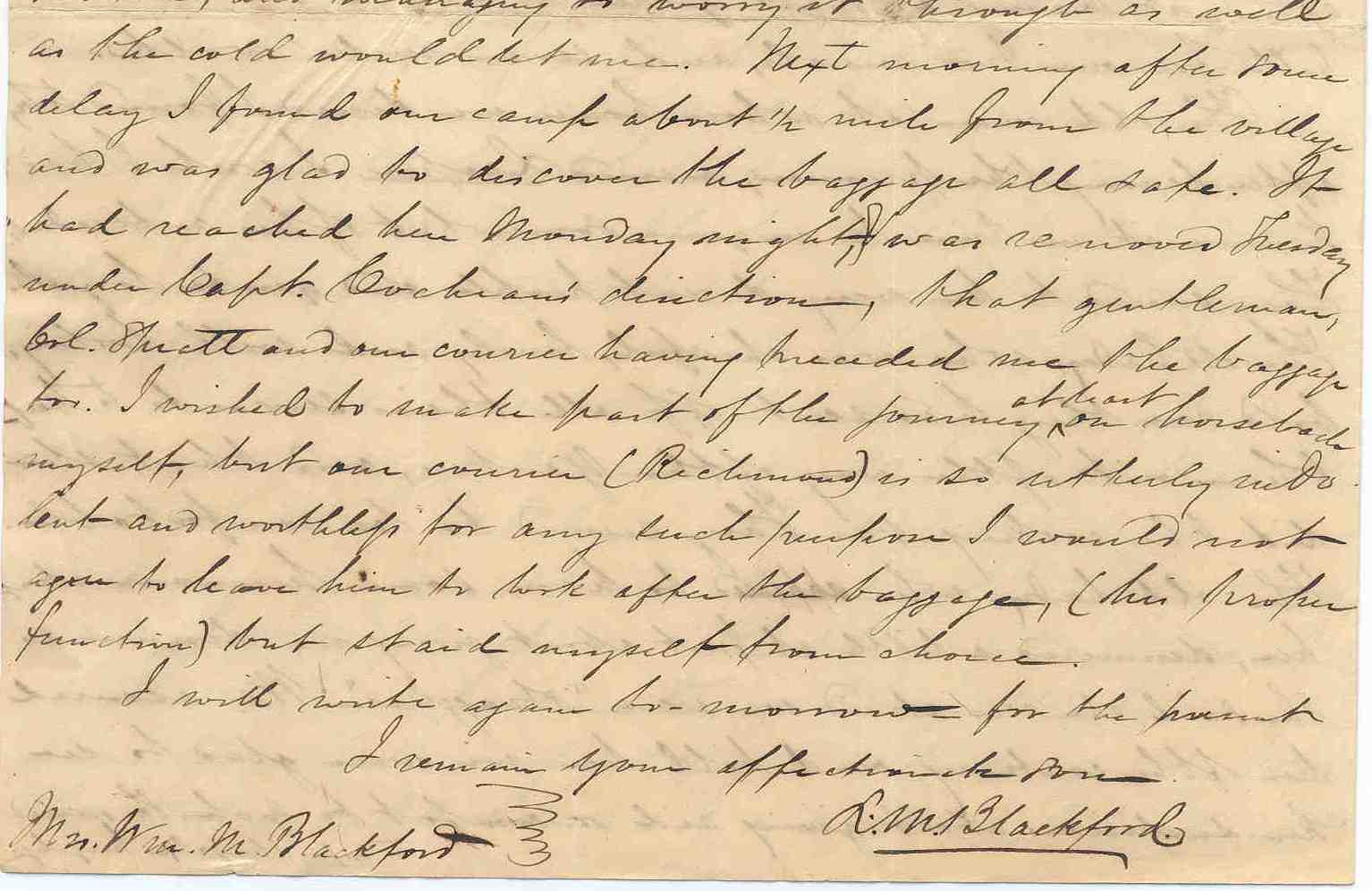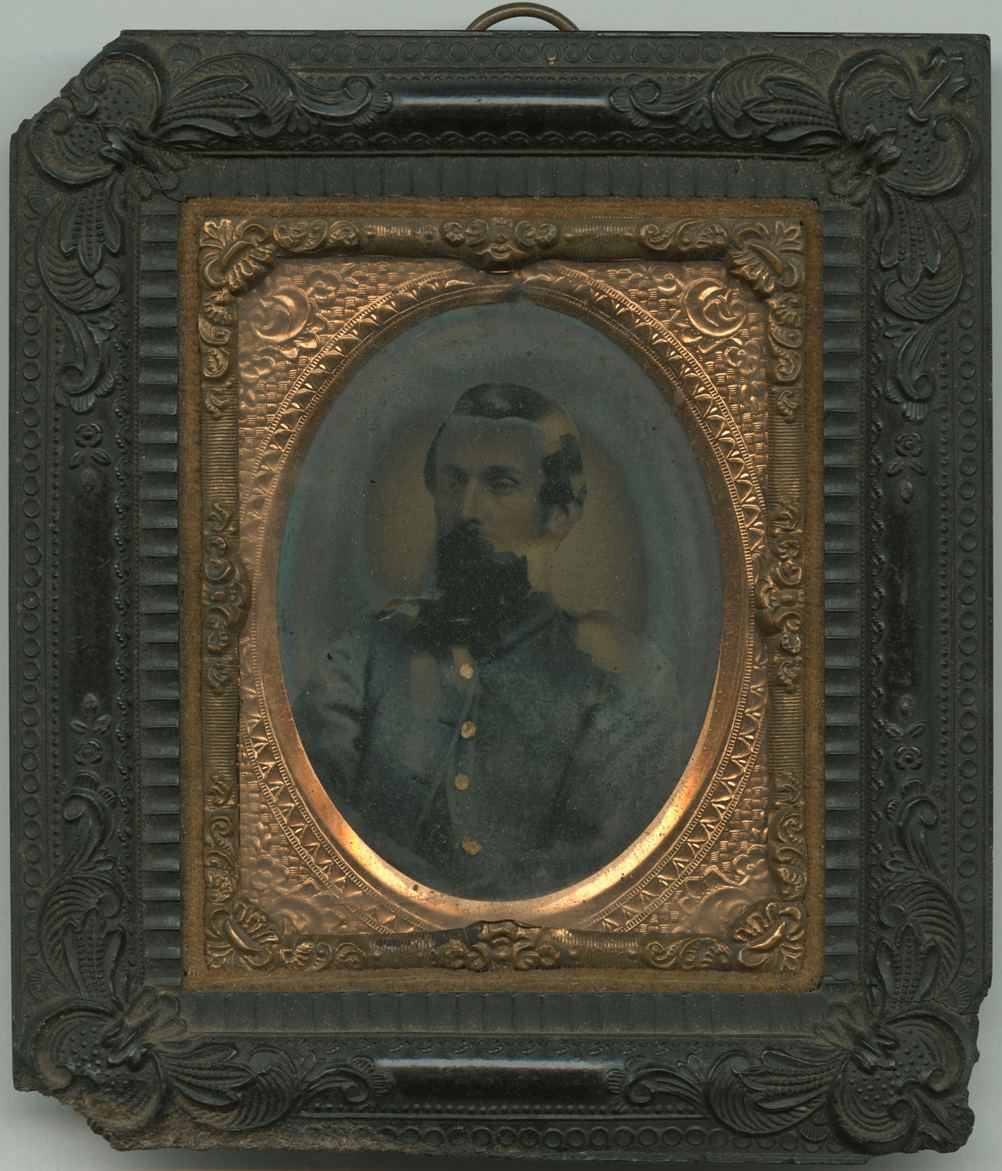Item description: Letter, dated 12 November 1863, from Launcelot Minor “Lanty” Blackford to his mother, Mary Berkeley Minor Blackford. Blackford discusses the death of his Uncle Lucius, camp life (including hunting and visiting officials), rail travel, and his pride in the contributions of Virginians in battle.
Item citation: From folder 85 of the Blackford Family Papers #1912, Southern Historical Collection, Wilson Library, University of North Carolina at Chapel Hill.
Item transcription:
Military Court HdQrs Longstreet’s Corps A. T.
“Sweetwater” – Monroe Co. Tennessee… on
E. Tenn. & Ga. R. R. – 40 miles S. W. of Knoxville
Thursday Night – November 12 1863
Mrs. Wm. M. Blackford, Lynchburg, Va.
My Dear Mother.
I addressed Father a short letter a week ago on the eve of our departure from “Missionary Ridge” and the Army before Chattanooga for this place, and now take the first opportunity I have had for writing more at length to devote to you.
Your letter of the 29th ult. from Edgewood containing the announcement of Uncle Lucius’ death reached me on the 7th. Luther from Lynchburg had fully prepared me for this sad intelligence, but, while the shock of it was this les-sened, it did not less grieve me. I believe that in my dear Uncle you and all yours have lost one of the kind-est, most steadfast and [?] friends we ever had – one of those whose [“adoption tried”?] had shown us how fully he could be relied on, how sincerely he was to be esteemed and loved. For my own part I can truly say he was he very first person in the world, after my im-mediate family [?], to whom in adverse circumstances I should have turned for comfort and for assistance, so well assured did I feel of his interest in me. Nor was there any person who more fully and affectionately sympathized in every plan or anticipation of the future that interested me. You know how attaching a quality this is. I never was with grateful remembrance to a visit made at Edge-wood put after my failure at the University in 1859, when he consoled me for my misfortune and generously offered to make an arrangement (which I knew he could not then do without great inconvenience) to advance the funds necessary for another year in college. The very embarrasment in which he was thus involved had been occasioned, if I remem-ber rightly, by the purchase of a family of negroes, formerly belonging to the Bromhill estate, which would then have been sold to a trader; & they servants he did not even care to own.
In his death there are two great sources of consolation which, amid the sadness occasioned by the bereavement it will be well for us to weigh duly. The first and great-est that without which every other would be poor indeed, is the fact that he died in the faith of a Christian, relying solely upon the merits of our Savior Christ for his salvation. The other is that his health of late years had, in the providence of God, become so infirm, and life thus so robbed of one of the most indispensible conditions of happiness, that, the transfer to a “better country” and the matchless rest of an eternity above must be regarded as for him a peculiarly happy change. In addition to the two conditions just [advented?] to them is another worth regarding, and that is that in the death of any believer now there is less ground to mourn, as far as they are concerned personally, than at any time we have ever before seen. Our unhappy country is so dis-tracted by war and so overwhelmed by the numberless calamities that follow in its train; iniquity does so abound and the prospects of pacification and tran-quility in our midst are so indistinct , that life is really less worth having than it ever was before. Can we, then, or ought we to lament the death of any Christian friend as we would have done five years ago?
Your letter though short contained a singularly con-cise and graphic account of your sad visit at Edgewood. I have read and often re-read it with deep interest, and shall carefully preserve it, as I do all of your letters. I am much concerned that Charles did not reach home in time to stand by his father’s death-bed: Uncle L. died, as I understand, on Sunday night Oct. 24, and Charles did not reach Edge-wood until Monday. I am very glad Lucy Landon is to be so near and that Bob will be with you. Give my love & sympathy to both of them. If I mistake not you will find Bob a worthy successor of his two incomparable brothers who have already [hard?] at our house, and they are two of the both superiour men in the world, I think I would like to know in what condition Uncle L. left his affairs, estate, etc.
I now recur to the narrative of my camp life which I have endeavored to maintain since my arrival in Tenn. with more care even than formerly, hoping that my letters will be carefully preserved for my own use hereafter as they were when I was in the artillery.
The inactivity of Gen. Bragg’s army seemed, toward the close of October, to have become so confirmed that we all came to consider it more than likely we should spend the winter before Chattanooga, as indeed the other two corps probably will yet. Gen. Longstreet’s HdQrs. were situated on the Lafayette Road, 2 miles south of Rossville (a locality well known in that vicinity as the former residence of old John Ross, Chief of the Cherokee Nation) and about 11 miles in the same direction from Chattanooga. Rossville is on the boundary line between Tenn. and Ga., which the ‘Lafayette Road,’ leading from Chattanooga, Tenn., to Lafayette, Ga., intersected at right angles: it is not even a village, as I saw only one inhabited house, but seems to have been until recently the house of a man of large substance A large and un-commonly fine spring of water and an extensive orchard are on the premises, which, with numerous outhouses, fact of its being where divers ways meet, make Rossville a permanent campground of some sort or other. Our HdQrs were thus, as you see, in Georgia, but whenever we went out even for an afternoon ride we used to pass out of Walker Co., Ga., into Hamilton Co., Tenn. “Missionary Ridge” and “Lookout Mountain” are both chiefly in Ga., the upper part only being in Tenn. Our quarters on the side of the ridge, in Ga.; Gen.l Bragg’s 4 or 5 miles north of us on the top of it, in Tenn.
We had so fully persuaded ourselves of a prolonged stay where we were that, after looking about in the neighborhood in vain for a house, we determined to make ourselves comfortable in tents and had a brick chimney built to each of the three, the brick hauled from an abandoned kiln near us, the layer one of the guard detailed at HdQrs. The chimney proved an entire success and we thought ourselves snug-ly equipped for the rest of autumn at least. Tuesday evening, the 3d., the bricklayer finished the last one, and I disbursed to him, on behalf of the mess, $15.00. Just 24 hours after the order to move came, and the mess with unanimous disgust voted chimneys a humbug. We left them the next morning standing grim, gaunt, alone, the mud used for mortar not yet hard, silent witnesses of the uncertainty of army movements.
On Wednesday, 4th, we had another dining day, our guest being Dr. Cullen and Dr. Barksdale of the staff, and Major Wood (bro. to the Col.) Two invited guests disappointed us. In several different way, I (as caterer) had gotten together the wherewithal to set before our guests, and Tarleton did it full justice in the cooking. About 4 1/2 P.M. we sat down to fine old ham, roast mutton-haunch, chicken pie, a dozen broiled partridges, sweet potatoes, rice-fritters, and butter. It was the most successful hit my housekeeping has yet achieved, and was undoubtedly the finest dinner I have ever seen in camp. I tell you of such things supposing they will amuse you; not because I attach so much importance to a good dinner.
On Tuesday, 3d., a beautiful day, I went out with Capt. Garce, (A.D.C. to Gen. L.) hunting partridges, not in the old fashioned way with powder and shot, but to net them. We were successful after an hour or two in bagging 21 as fine as you ever saw. The Colonels had been out the same morning with Capt. G. and caught only 12. Our share of the day’s spoils (1/2) furnished our table with a choice dish at two meals; one as mentioned above. You can’t think how we enjoyed them. We had long desired to have the Medical mess to dine with us, particularly when Mr. Lawley, the correspondent of the Lon-don Times, was their guest, which was the case some weeks. I was never able, however, while he was here, to get materials to make up a decent dinner.
Speaking of Englishmen, have you and Father and Mary seen the Diary of an English Officer (Lt. Col. Fulmantle of the [Cold Shean?] Guard) on the Get-tysburg Campaign. It appeared first in Blackwood’s Magazine for Sept. and was copied in the Rich? “Record” for Oct. 8. It is richly worth reading. Col. F. was Gen. Longstreet’s guest Thursday morning, the 5th, this day one week ago, we left our camp on Missionary Ridge and came on in the rain to Tyner’s Station on the Cleveland and Chattanooga R.R. where the corps rendezvoused to go by rail to Sweet-water. I came on unintentionally ahead of our wagons, and, not finding our camp of course, accepted the hospitality of Lt. Colston of Alexander’s Battn. Art.y, a young gen-tleman from Md. who is a far away kinsman of Sister Sue’s. Friday about noon the whole of Corps HdQrs were col-lected at the station, baggage deposited there to await transportation with the guard, staff, attaches, and hdqr. horses, and wagons sent on empty. That evening Chas. got his sick furlough and next morning (Saturday) went to Chickamauga, 3 miles distant, on the Westn. & Atlantic R.R. to take passage for Va. After a series of vexations and incomprehensible delays about the running fo the trains between Tyner’s and Cleveland, the Gen-eral, his staff, and all the mounted men connected with HdQrs., about noon on Sunday, went on on horseback to Cleveland, 20 miles distant at the junction of the C. & C. R.R. with the E.T. & Ga. R.R. running from Dalton, Ga. to Knoxville, Tenn. A de-tail was left to see after the baggage, but I preferred to stay with ours and did so. It was sundown Sunday evening before we got it off having thus tarried 4 days at the Station, waiting for the removal of obstructions, etc. etc. on the R. R. The delay was tedious and uncomfortable enough, the weather being mostly cold and windy and the chance of a train being ready for us at any time generally preventing us from leaving the spot.
My journey from Tyner’s to Sweet Water will be not unworthy of record in the annals of railway locomotion. I was on the road 30 hours, making an average of something less than 2 miles an hour. After seeing the [Court?] bag-gage properly stowed away in a box car, I accepted the invitation of the R.R. agent to take a seat in a pas-senger coach attached to a train which was to start at the same hour with the one in which my baggage was, which could offer no better accommodations than indifferent box cars. Both were loaded with troops, and the passenger coach referred to filled with officers of the Texas brigade of Hood’s Division, the men of which were in the same train. Having acquaintances among these officers and the evening being very cold, I congratulated myself on the change, though not without some misgivings that it would give me inconvenience. About sundown we moved off, at a very snail’s pace, but still expecting to make Sweet Water before morning. There were constant and long halts, sometimes varied by the conductor’s applying to the colonel commanding, who sat near me to order details of his men to help dip water into the [tender?], and cut wood. This he always did, though the men worked, I was told, very unwil-lingly as the night was exceedingly cold and the proceeding an entirely novel and unprecedented one.
About the small hours’ of the night, after an un-usually long halt, the slumbering [nine a ten?] of the coach was startled by the discovery, made by some one who had ventured out in the cold to look, that our car which was the hindmost of a long train, had been in some unaccountable way dropped, and was standing all alone on the track, about midway as we supposed between Cleveland & Tyner’s; the locomotion and cars in whose company it had started being miles ahead before we discovered our forlorn condition. I have never ascertained how the desertion occurred; there being a conflict of opinion, some saying the coupling pin had broken, other that it had been withdrawn surreptitiously by some mischievous scamp in the Texas Brigade who wanted to get rid temporarily of his officers. Be this as it may we remain-ed where we were for some time, when another train came on with two batteries of artillery and took us up. We then went on to Charleston 11 miles or so above Cleveland.
Here I fell in with Tom Mercer (the Dr.’s son), who is a lieu-tenant in one of the batteries of Alexander’s Battalion that were on the train. Finding that the train was likely to tarry a long while at Charleston, and most of us being pretty hungry, it was just about breakfast time and we had none. A party of 8 consisting of a Lt. Col. and 5 lieutenants of the Tex. Brig., Mercer & myself, having the engine driver to promise to stop and take us up as he came on, started out to try and get something to eat. We crossed the Hiwassee River immediately after leaving Charleston on a pontoon bridge & then kept on by the R. R. For the first two or three miles we had no success, but finally secured a very fair breakfast, paid our dollar around, and at our lei-sure walked on. An hour or two afterwards, having still time, and a spare corner in our stomach, we laid to again and got an excellent dinner, about two 0’clock. We ate the dinner more on the prin-ciple of Dugold Dayitty, than because we were really hungry. It turned out very well as none of us ate again before breakfast time next morning. After dinner we walked a couple of miles to a station ahead where we took our seats in the train again, it having at last gotten up. We felt all the better for our two meals, and seven miles’ walk.
The old man at whose house we dined I found to be, after leaving the premises, named Luper. I wish I had known it in time to inquire somewhat of his antecedents. They seemed to be very decent people and quite loyal. The old lady, who was cheerful, lovely and well-looking, told me they had sent off all their servants to keep them out of the way of the Yankees, and that she did the cooking, etc. They seemed to be comfortable. The old lady, who appeared to have some humour about her, demurred a little at first about giving us dinner, as she said she was afraid we were “stragglers”. We assured her of the contrary, and told her we were glad to see her suspicions about giving aid or comfort to such. She seemed to enjoy the joke hugely.
Altogether we had quite a jolly day of it in McMinn Co. Tenn., and did not regret the delay. The Tex-as officers were generally sprightly, well-bred and agree-able fellows, and we all enjoyed the little episode in the tedious journey very much. Tom Mercer & myself were the only Virginians in the party; I laugh to say South there is a strong dash of Virginian-ism in every body one meets here from the old A.N.V., I mean in Hood’s and McLaws’ Divisions chiefly. It is impossible not to feel both pride and gratification at the affection at the respect that is evidently entertained for the “old Dominion”, and the generally expressed longing to live all one’s military life there, that is plainly visible among Gen. Longstreet’s troops from Lee’s army.
In Gen. Longstreet’s congratulatory order to his corps, dated Sept. 23, relative to the victory of Chickamauga, he mentioned the names of light privates of inf. 7, who distinguished themselves by the capture of one or more stands of colours each. Of these 8, 3 were Mississippians, 1 a Floridian, and 4 Virginians. As there are only about 3 regiments of Infantry from Va. in this army this looks well for our state.
To return to my journey. Our train finally reached here at 10 or 11 o’clock Tuesday night. I spent the remainder of the night in the coach and by fires outside, sleeping a little, and managing to worry it through as well as the cold would let me. Next morning after some delay I found our camp about 1/2 mile from the village and was glad to discover the baggage all safe. It had reached here Monday night, & was removed Tuesday under Capt. Cochran’s direction, that gentleman, Col. Spratt and our courier having preceded me the baggage too. I wished to make part of the journey at least on horseback myself, but our courier (Richmond) is so utterly redo-lent and worthless for any such purp0se I would not agree to leave him to look after the baggage, (his proper function) but staid myself from choice.
I will write again tomorrow for the present
I remain your affectionate son
L. M. Blackford
Mrs. W. M. Blackford}
More about this item: Ambrotype, Private L. M. Blackford, Rockbridge Artillery, 1862.

